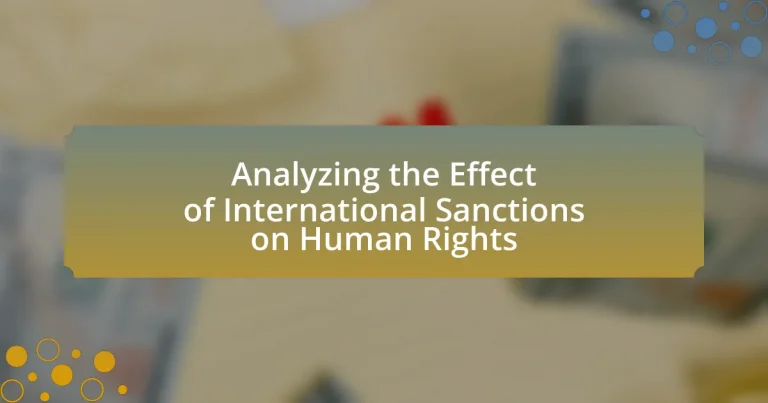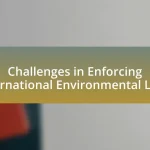International sanctions are restrictive measures imposed by countries or organizations to influence the behavior of nations, groups, or individuals, primarily aimed at enforcing compliance with international laws and promoting peace. This article analyzes the multifaceted effects of international sanctions on human rights, detailing how they can lead to economic hardship, social unrest, and humanitarian crises, particularly in countries like Iraq, North Korea, and Venezuela. It categorizes sanctions into economic, trade, military, and diplomatic types, examining their intended and unintended consequences on human rights, including access to health, food, and education. The article also discusses best practices for implementing sanctions to minimize harm to vulnerable populations and the role of international organizations in monitoring human rights during sanctions.
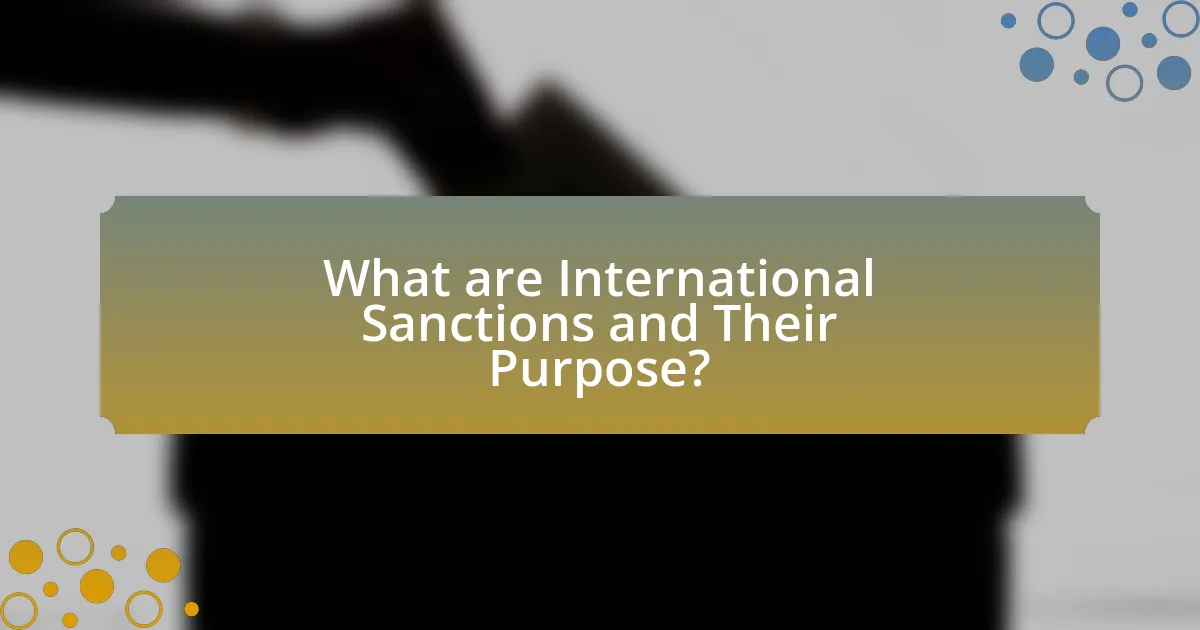
What are International Sanctions and Their Purpose?
International sanctions are restrictive measures imposed by countries or international organizations to influence the behavior of a target nation, group, or individual. Their primary purpose is to compel compliance with international laws or norms, deter undesirable actions, and promote peace and security. For instance, the United Nations often implements sanctions to address issues such as human rights violations, nuclear proliferation, or acts of aggression, as seen in the sanctions against North Korea aimed at curbing its nuclear weapons program. These measures can include trade restrictions, asset freezes, and travel bans, which are designed to exert economic and political pressure on the targeted entity to change its behavior.
How do international sanctions impact countries?
International sanctions impact countries by restricting their economic activities, limiting access to financial markets, and reducing trade opportunities. These measures can lead to significant economic downturns, increased poverty, and social unrest, as evidenced by the sanctions imposed on countries like Iran and North Korea, which have resulted in severe economic challenges and humanitarian crises. For instance, the United Nations sanctions against Iraq in the 1990s led to a drastic decline in living standards and widespread suffering among the civilian population, highlighting the profound effects sanctions can have on human rights and overall societal well-being.
What types of international sanctions exist?
International sanctions can be categorized into several types: economic sanctions, trade sanctions, military sanctions, and diplomatic sanctions. Economic sanctions restrict financial transactions and trade, often targeting specific sectors or entities within a country. Trade sanctions limit or prohibit trade with a specific country, affecting imports and exports. Military sanctions involve arms embargoes or restrictions on military assistance, while diplomatic sanctions may include the reduction or severance of diplomatic relations. These sanctions are often employed to influence a country’s behavior or policies, particularly in relation to human rights violations.
Why are sanctions imposed on specific nations?
Sanctions are imposed on specific nations primarily to influence their behavior and policies, particularly in response to violations of international law or human rights abuses. For instance, the United Nations and various countries have enacted sanctions against nations like North Korea and Iran to deter nuclear proliferation and address human rights violations. These measures can include trade restrictions, asset freezes, and travel bans, aimed at pressuring governments to comply with international norms and protect human rights. Historical examples include the sanctions against South Africa during apartheid, which were intended to dismantle the oppressive regime and promote equality.
What is the relationship between sanctions and human rights?
Sanctions can significantly impact human rights by either promoting or undermining them, depending on their design and implementation. Targeted sanctions, such as asset freezes and travel bans on specific individuals, aim to hold violators accountable without harming the general population, potentially supporting human rights. Conversely, broad economic sanctions can lead to humanitarian crises, exacerbating poverty and limiting access to essential services, which can violate the rights to health, food, and education. For instance, the United Nations sanctions on Iraq in the 1990s resulted in severe humanitarian consequences, highlighting the detrimental effects of poorly designed sanctions on human rights.
How can sanctions affect the human rights situation in targeted countries?
Sanctions can significantly deteriorate the human rights situation in targeted countries by restricting access to essential goods and services, which can lead to increased poverty and suffering among the civilian population. For instance, comprehensive economic sanctions imposed on Iraq in the 1990s resulted in widespread malnutrition and a collapse of healthcare services, contributing to a humanitarian crisis that severely impacted the rights to health and life. Additionally, sanctions can empower authoritarian regimes by providing them with a pretext to suppress dissent and justify human rights abuses, as seen in North Korea, where the government uses sanctions to rally nationalistic sentiments while cracking down on political opposition.
What are the intended and unintended consequences of sanctions on human rights?
Sanctions are intended to pressure governments to improve human rights conditions by restricting access to resources and international support. For example, economic sanctions against countries like North Korea aim to compel compliance with international human rights standards by limiting their financial capabilities. However, unintended consequences often arise, such as exacerbating the suffering of the general population rather than the targeted regime. Research by the United Nations indicates that sanctions can lead to increased poverty and reduced access to essential services, which ultimately harms human rights rather than promoting them.
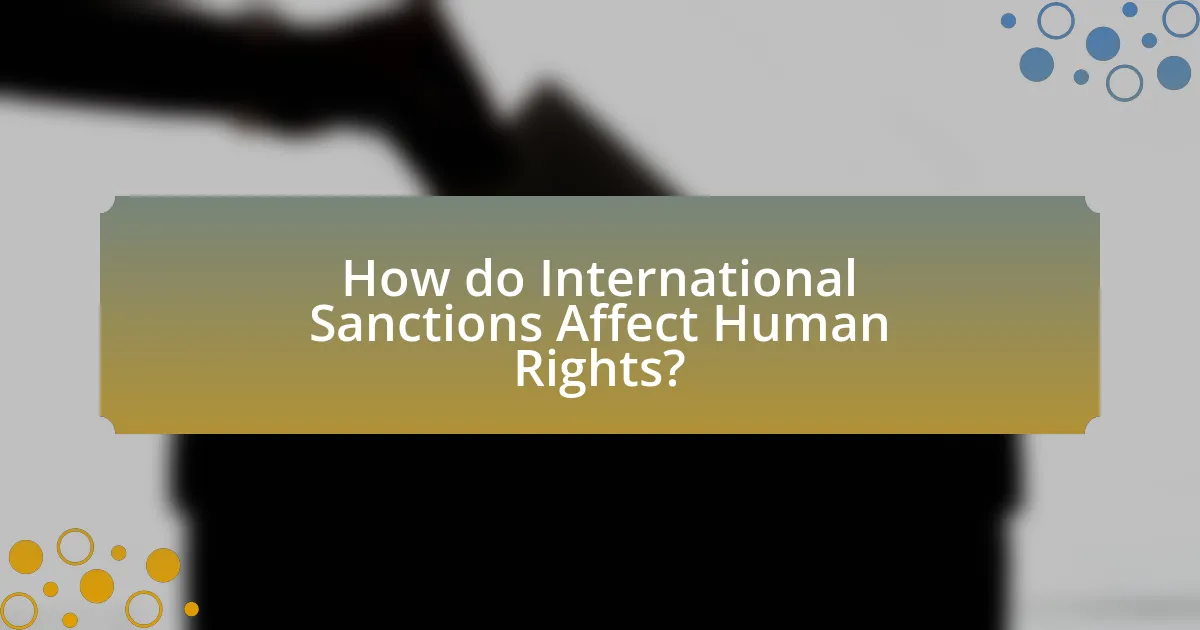
How do International Sanctions Affect Human Rights?
International sanctions can significantly undermine human rights by restricting access to essential goods and services, leading to humanitarian crises. For instance, sanctions imposed on countries like Iraq in the 1990s resulted in widespread malnutrition and health crises, disproportionately affecting vulnerable populations, including children and the elderly. Additionally, sanctions can limit the ability of civil society organizations to operate, thereby stifling freedom of expression and assembly. Research by the United Nations has shown that economic sanctions often exacerbate poverty and inequality, which are critical factors in the violation of human rights.
What specific human rights are impacted by international sanctions?
International sanctions specifically impact the rights to health, food, and education. These sanctions can lead to economic hardship, restricting access to essential goods and services, which in turn affects the ability of individuals to secure adequate healthcare, nutrition, and educational opportunities. For instance, the United Nations has reported that sanctions can exacerbate poverty and limit access to medical supplies, thereby violating the right to health as outlined in the International Covenant on Economic, Social and Cultural Rights. Additionally, sanctions can disrupt food supply chains, leading to malnutrition and hunger, which directly contravenes the right to an adequate standard of living.
How do sanctions influence civil and political rights?
Sanctions can significantly undermine civil and political rights by restricting access to essential resources and services, which can lead to increased repression and human rights violations. For instance, economic sanctions often result in diminished government revenue, prompting authorities to intensify control over the population to maintain power, thereby curtailing freedoms such as expression and assembly. Research by the United Nations has shown that sanctions can exacerbate humanitarian crises, leading to a deterioration in the overall human rights situation in targeted countries, as seen in cases like Iraq in the 1990s, where sanctions contributed to widespread suffering and repression.
What is the effect of sanctions on economic, social, and cultural rights?
Sanctions significantly undermine economic, social, and cultural rights by restricting access to essential goods and services. For instance, economic sanctions can lead to shortages of food, healthcare, and education, directly impacting the well-being of the population. A study by the United Nations Human Rights Council in 2019 highlighted that sanctions imposed on countries like Venezuela resulted in a dramatic increase in malnutrition rates and a decline in healthcare access, violating the right to health and adequate living standards. Furthermore, cultural rights are affected as sanctions can limit the ability of individuals to participate in cultural life and access cultural heritage, as seen in cases where sanctions hinder the import of cultural materials and resources.
How do different types of sanctions vary in their impact on human rights?
Different types of sanctions have varying impacts on human rights, primarily categorized into economic sanctions, diplomatic sanctions, and military sanctions. Economic sanctions, such as trade restrictions or asset freezes, often lead to widespread poverty and deprivation, negatively affecting access to essential services like healthcare and education, as evidenced by the situation in Iraq during the 1990s, where sanctions contributed to a significant decline in public health indicators. Diplomatic sanctions, which may involve the reduction of diplomatic relations, can limit a country’s engagement with international human rights mechanisms, potentially stalling progress on human rights issues. Military sanctions, including arms embargoes, can prevent a state from suppressing dissent through violence, but may also leave populations vulnerable to internal conflicts, as seen in Libya post-2011. Each type of sanction thus has distinct consequences for human rights, influenced by the specific context and implementation of the sanctions.
What is the difference between economic sanctions and military sanctions?
Economic sanctions involve the restriction of trade and financial transactions to influence a country’s behavior, while military sanctions refer to the prohibition of military assistance or arms sales. Economic sanctions can include measures like trade embargoes or asset freezes, aimed at crippling a nation’s economy to compel compliance with international norms. For example, the United States imposed economic sanctions on Iran to deter its nuclear program, significantly impacting its economy. In contrast, military sanctions focus specifically on limiting a nation’s military capabilities, such as the arms embargo against North Korea, which aims to prevent the development of its nuclear weapons program. Thus, the primary difference lies in the nature of the restrictions: economic sanctions target financial and trade activities, whereas military sanctions restrict military resources and support.
How do targeted sanctions compare to comprehensive sanctions in terms of human rights effects?
Targeted sanctions generally have less detrimental effects on human rights compared to comprehensive sanctions. Targeted sanctions, which focus on specific individuals or entities, aim to minimize the broader impact on the civilian population, thereby reducing the likelihood of widespread human rights violations. In contrast, comprehensive sanctions often lead to significant economic hardship for the general populace, which can exacerbate human rights abuses, such as increased poverty, lack of access to essential services, and heightened repression by the state. For instance, a study by the United Nations in 2019 indicated that comprehensive sanctions imposed on countries like Iraq in the 1990s resulted in severe humanitarian crises, while targeted sanctions in cases like South Africa during apartheid were more effective in promoting human rights without causing widespread suffering.
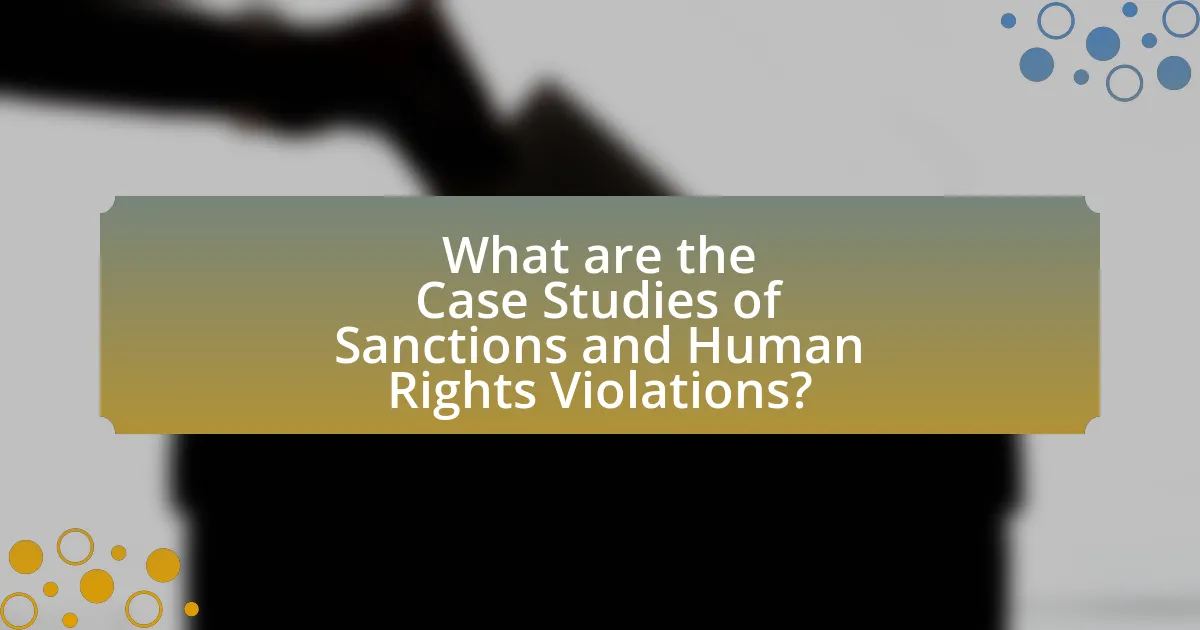
What are the Case Studies of Sanctions and Human Rights Violations?
Case studies of sanctions and human rights violations include the situations in Iraq, North Korea, and Venezuela. In Iraq, the United Nations sanctions imposed in the 1990s led to significant humanitarian crises, with estimates of over half a million child deaths attributed to the sanctions, as reported by UNICEF. In North Korea, international sanctions aimed at curbing nuclear weapons development have resulted in widespread food shortages and malnutrition, affecting millions of civilians, according to reports from the World Food Programme. In Venezuela, sanctions targeting the government have exacerbated the economic crisis, leading to severe shortages of food and medicine, which the United Nations has linked to increased mortality rates. These case studies illustrate the complex relationship between sanctions and human rights violations, highlighting the unintended consequences that can arise from such measures.
What are notable examples of sanctions affecting human rights?
Notable examples of sanctions affecting human rights include the economic sanctions imposed on North Korea, which have led to widespread food shortages and malnutrition among its population. The United Nations Security Council has implemented these sanctions in response to North Korea’s nuclear weapons program, resulting in severe restrictions on trade and access to essential goods. Another significant example is the sanctions against Venezuela, which have exacerbated the humanitarian crisis, leading to increased poverty and a collapse of healthcare services. The U.S. sanctions targeting the Venezuelan government aim to pressure political change but have also contributed to the deterioration of living conditions for ordinary citizens. Additionally, sanctions against Iran, particularly those related to its nuclear program, have impacted access to medical supplies and healthcare, affecting the general population’s health and well-being. These examples illustrate how sanctions, while intended to influence government behavior, can have profound negative effects on human rights and the welfare of civilians.
How did sanctions against Iraq impact human rights in the 1990s?
Sanctions against Iraq in the 1990s severely impacted human rights, leading to widespread suffering among the civilian population. The United Nations imposed comprehensive economic sanctions following Iraq’s invasion of Kuwait in 1990, which resulted in significant shortages of food, medicine, and essential services. According to a 1999 report by the United Nations Children’s Fund (UNICEF), the mortality rate for children under five in Iraq increased dramatically, with estimates suggesting that over 500,000 children died as a result of malnutrition and preventable diseases exacerbated by the sanctions. Additionally, the sanctions restricted access to medical supplies and healthcare, further deteriorating the health and well-being of the Iraqi population. These conditions contributed to a humanitarian crisis that violated fundamental human rights, including the right to life, health, and adequate living standards.
What lessons can be learned from the sanctions imposed on North Korea?
The sanctions imposed on North Korea illustrate that while economic pressure can be effective in compelling a state to alter its behavior, they often have significant humanitarian consequences. Specifically, these sanctions have led to increased poverty and food insecurity among the North Korean population, as evidenced by reports from the United Nations, which indicate that approximately 10 million people in North Korea are in urgent need of food assistance due to the economic impact of sanctions. Additionally, the sanctions have not succeeded in achieving their primary goal of denuclearization, highlighting that sanctions alone may not be sufficient to influence a regime’s strategic decisions. Thus, the lessons learned emphasize the need for a balanced approach that considers both the intended political outcomes and the potential humanitarian impacts on the civilian population.
What role do international organizations play in monitoring human rights during sanctions?
International organizations play a critical role in monitoring human rights during sanctions by providing oversight, reporting violations, and advocating for affected populations. These organizations, such as the United Nations and Amnesty International, conduct investigations, gather data, and publish reports that highlight the human rights implications of sanctions. For instance, the UN Human Rights Council has established mechanisms to assess the impact of sanctions on civilians, ensuring that humanitarian needs are addressed and that sanctions do not disproportionately harm vulnerable groups. This monitoring is essential for holding states accountable and ensuring compliance with international human rights standards, as evidenced by various reports that document human rights abuses linked to sanctions in countries like Iraq and Venezuela.
How do the United Nations and NGOs assess the impact of sanctions on human rights?
The United Nations and NGOs assess the impact of sanctions on human rights through systematic monitoring, reporting, and analysis of the socio-economic conditions in targeted countries. They utilize various methodologies, including data collection on human rights violations, economic indicators, and humanitarian access, to evaluate the sanctions’ effects. For instance, the UN Human Rights Council often commissions reports that detail the consequences of sanctions on vulnerable populations, highlighting specific cases of human rights abuses linked to economic restrictions. Additionally, NGOs like Human Rights Watch and Amnesty International conduct independent investigations and publish findings that illustrate how sanctions can exacerbate human rights violations, such as increased poverty and restricted access to essential services. These assessments are crucial for informing policy decisions and advocating for adjustments to sanctions regimes to mitigate adverse human rights impacts.
What mechanisms exist for accountability regarding human rights violations during sanctions?
Accountability mechanisms for human rights violations during sanctions include international legal frameworks, monitoring bodies, and advocacy organizations. The United Nations Human Rights Council and various treaty bodies, such as the International Covenant on Civil and Political Rights, provide oversight and can investigate allegations of violations. Additionally, non-governmental organizations like Human Rights Watch and Amnesty International document abuses and advocate for accountability. Historical examples, such as the sanctions against Iraq in the 1990s, illustrate the need for these mechanisms, as they highlighted significant human rights concerns that prompted international scrutiny and calls for accountability.
What are the best practices for implementing sanctions to minimize human rights violations?
The best practices for implementing sanctions to minimize human rights violations include targeted sanctions, comprehensive assessments, and continuous monitoring. Targeted sanctions, such as asset freezes and travel bans on specific individuals responsible for human rights abuses, effectively limit their ability to operate without broadly harming the civilian population. Comprehensive assessments involve evaluating the potential impact of sanctions on human rights conditions, ensuring that measures do not inadvertently exacerbate suffering among vulnerable groups. Continuous monitoring allows for adjustments based on the evolving situation, ensuring that sanctions remain effective and do not lead to unintended consequences. Historical examples, such as the targeted sanctions against the regime in Myanmar, demonstrate that these practices can lead to improved human rights outcomes without causing widespread harm.
How can policymakers design sanctions to protect vulnerable populations?
Policymakers can design sanctions to protect vulnerable populations by implementing targeted sanctions that specifically aim to minimize harm to civilians while holding oppressive regimes accountable. Targeted sanctions, such as asset freezes and travel bans on key individuals rather than broad economic sanctions, can limit the negative impact on essential goods and services that vulnerable populations rely on. For instance, the United Nations has emphasized the importance of smart sanctions that focus on individuals and entities responsible for human rights abuses, thereby reducing collateral damage to the general populace. Additionally, incorporating humanitarian exemptions in sanctions can ensure that aid and essential supplies continue to reach those in need, as seen in the case of sanctions against Iran, which included provisions for humanitarian assistance.
What strategies can be employed to ensure humanitarian exemptions in sanctions regimes?
To ensure humanitarian exemptions in sanctions regimes, clear legal frameworks and guidelines must be established that explicitly outline the scope and criteria for such exemptions. These frameworks should be developed in consultation with humanitarian organizations to ensure they address the needs of affected populations. For instance, the United Nations has implemented guidelines that allow for the provision of essential goods and services, such as food and medical supplies, even in sanctioned countries, demonstrating a structured approach to humanitarian exemptions. Additionally, regular monitoring and reporting mechanisms should be instituted to assess the impact of sanctions on humanitarian access, allowing for timely adjustments to the sanctions regime as necessary. This approach is supported by the findings of various studies, including those by the International Crisis Group, which emphasize the importance of balancing sanctions with humanitarian needs to mitigate adverse effects on civilian populations.
